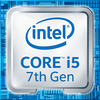Intel Celeron N4020 vs Intel Core i5-7500
Intel Celeron N4020
► remove from comparison
Der Intel Celeron N4020 ist ein Ende 2019 vorgestellter Dual-Core-SoC, der hauptsächlich in preiswerten Notebooks verbaut wird. Er taktet mit 1,1 bis 2,8 GHz (Einzelkern Burst) und gehört der Gemini-Lake-Plattform an. Im Vergleich zum Vorgänger, dem Celeron N4000, ist der Refresh mit 200 MHz höher getaktet. Die Fertigung erfolgt wie beim Vorgänger Apollo Lake in einem 14-Nanometer-Prozesses mit FinFETs. Neben den vier CPU-Kernen integriert der Chip auch eine DirectX-12-fähige Grafikeinheit sowie einen DDR4/LPDDR4-Speichercontroller (Dual-Channel, 2.400 MHz, max. 8 GB). Der SoC kann nicht ausgetauscht werden, da er direkt mit dem Mainboard verlötet wird (BGA Package).
Im Vergleich zum Celeron N3350, bietet der N4020 leicht verbesserte CPU Kerne mit 400 MHz höherem Boost Takt, doppeltem L2 Cache, ein kleineres Package, neuere Displayanschlüsse und ein teilweise integriertes WLAN Modul (Wireless-AC9560 mit Companion Module).
Architektur
Die Prozessor-Architektur der Gemini Lake SoCs wurde im Vergleich zum Vorgänger leicht weiterentwickelt. Intel nennt sie nun Goldmont Plus Kerne und verdoppelt den Level 2 Cache von 2 auf 4 MB. Trotzdem sollte die Pro-MHz-Leistung noch deutlich hinter den aktuellen Kaby-Lake Prozessoren bleiben.
Performance
Die CPU-Leistung des Celeron N4020 mit 2 CPU-Kernen und einer Taktrate von 1,1 bis 2,8 GHz dürfte stark vom Kühlsystem abhängen. Wenn der Boost Takt gehalten werden kann, sollte der N4020 einige Prozent schneller rechnen als der Vorgänger Celeron N4000 (-200 MHz Boost). Der ähnlich benannten Celeron N4120 bietet vier Kerne und ist damit bei Multithread-Tests deutlich schneller. Der N4020 bewältigt jedoch problemlos die meisten Alltagsanwendungen (Office, Browsing), jedoch ist Multitasking nur beschränkt möglich.
Grafik
Die integrierte UHD Graphics 600 unterscheidet sich nur durch die verbesserten Displayanschlüsse von der HD Graphics 500.
Weiterhin integriert der Chip eine fortschrittliche Videoeinheit, die auch die hardwarebeschleunigte Wiedergabe von VP9- und H.265-Material (8 Bit Farbtiefe) beherrscht.
Leistungsaufnahme
Der gesamte SoC wird von Intel wie der Vorgänger mit einer TDP von 6 Watt spezifiziert (SDP 4,8 Watt - Scenario Design Power). Damit kann der Chip prinzipiell rein passiv gekühlt werden, jedoch sind auch Varianten mit Lüfter möglich.
Intel Core i5-7500
► remove from comparison
Der Intel Core i5-7500 ist ein Quad-Core Desktop-Prozessor der gehobenen Mittelklasse auf Basis der Kaby-Lake-Architektur, der im August 2015 vorgestellt wurde. Die in einem verbesserten 14-Nanometer-Prozess gefertigte CPU taktet mit 3,4 bis 3,8 GHz, bietet jedoch kein Hyper-Threading (daher nur 4 Threads).
Performance
Durch die relativ hohe Turbo-Taktrate positioniert sich der i5-7500 in etwa auf Höhe des mobilen Core i7-7700HQ. Auch anspruchsvollste Programme und Spiele werden von der High-End-CPU problemlos bewältigt.
Mehr Benchmarks finden Sie auch in unserem Vergleich der AMD Ryzen 7 CPUs gegen Intel CPUs.
Grafikeinheit
Für Grafikberechnungen zeigt sich die im Prozessor integrierte Intel HD Graphics 630 mit 24 EUs (Execution Units) verantwortlich, die mit 350 - 1100 MHz taktet. Die Leistung ist vergleichbar mit der alten Intel HD Graphics 530 und siedelt sich daher im absoluten Low-End-Bereich an, sodass aktuelle Spiele allenfalls in niedrigen Einstellungen flüssig dargestellt werden.
Leistungsaufnahme
Der TDP ist mit 65 Watt festgelegt und liegt damit deutlich höher als beim mobilen Core i7-7700HQ (35 Watt) aber auch deutlich unter den 91 Watt des Core i5-7600K.
| Model | Intel Celeron N4020 | Intel Core i5-7500 | ||||||||||||||||||||||||||||||||||||||||||||||||||||||||||||||||||||||||||||||||||||||||||||||||||||||||||||||||||||||||||||||||||||||||||||||||||||||||||||||||||||||||||||||||||||||||||||||||
| Codename | Gemini Lake refresh | Kaby Lake | ||||||||||||||||||||||||||||||||||||||||||||||||||||||||||||||||||||||||||||||||||||||||||||||||||||||||||||||||||||||||||||||||||||||||||||||||||||||||||||||||||||||||||||||||||||||||||||||||
| Series | Intel Gemini Lake | Intel Kaby Lake | ||||||||||||||||||||||||||||||||||||||||||||||||||||||||||||||||||||||||||||||||||||||||||||||||||||||||||||||||||||||||||||||||||||||||||||||||||||||||||||||||||||||||||||||||||||||||||||||||
| Serie: Kaby Lake Kaby Lake |
|
| ||||||||||||||||||||||||||||||||||||||||||||||||||||||||||||||||||||||||||||||||||||||||||||||||||||||||||||||||||||||||||||||||||||||||||||||||||||||||||||||||||||||||||||||||||||||||||||||||
| Clock | 1100 - 2800 MHz | 3400 - 3800 MHz | ||||||||||||||||||||||||||||||||||||||||||||||||||||||||||||||||||||||||||||||||||||||||||||||||||||||||||||||||||||||||||||||||||||||||||||||||||||||||||||||||||||||||||||||||||||||||||||||||
| L2 Cache | 4 MB | 1 MB | ||||||||||||||||||||||||||||||||||||||||||||||||||||||||||||||||||||||||||||||||||||||||||||||||||||||||||||||||||||||||||||||||||||||||||||||||||||||||||||||||||||||||||||||||||||||||||||||||
| Cores / Threads | 2 / 2 | 4 / 4 | ||||||||||||||||||||||||||||||||||||||||||||||||||||||||||||||||||||||||||||||||||||||||||||||||||||||||||||||||||||||||||||||||||||||||||||||||||||||||||||||||||||||||||||||||||||||||||||||||
| TDP | 6 Watt | 65 Watt | ||||||||||||||||||||||||||||||||||||||||||||||||||||||||||||||||||||||||||||||||||||||||||||||||||||||||||||||||||||||||||||||||||||||||||||||||||||||||||||||||||||||||||||||||||||||||||||||||
| TDP Turbo PL2 | 15 Watt | |||||||||||||||||||||||||||||||||||||||||||||||||||||||||||||||||||||||||||||||||||||||||||||||||||||||||||||||||||||||||||||||||||||||||||||||||||||||||||||||||||||||||||||||||||||||||||||||||
| Technology | 14 nm | 14 nm | ||||||||||||||||||||||||||||||||||||||||||||||||||||||||||||||||||||||||||||||||||||||||||||||||||||||||||||||||||||||||||||||||||||||||||||||||||||||||||||||||||||||||||||||||||||||||||||||||
| Socket | BGA1090 | FCLGA1151 | ||||||||||||||||||||||||||||||||||||||||||||||||||||||||||||||||||||||||||||||||||||||||||||||||||||||||||||||||||||||||||||||||||||||||||||||||||||||||||||||||||||||||||||||||||||||||||||||||
| Features | DDR4-2400/LPDDR4-2400 RAM, PCIe 2, MMX, SSE, SSE2, SSE3, SSSE3, SSE4.1, SSE4.2, VMX, SMEP, SMAP, MPX, EIST, TM1, TM2, Turbo, AES-NI, RDRAND, RDSEED, SHA, SGX | DDR3(L)-1600/DDR4-2400 Memory Controller, AVX, AVX2, AES-NI, TSX-NI, Quick Sync, Virtualization, vPro | ||||||||||||||||||||||||||||||||||||||||||||||||||||||||||||||||||||||||||||||||||||||||||||||||||||||||||||||||||||||||||||||||||||||||||||||||||||||||||||||||||||||||||||||||||||||||||||||||
| iGPU | Intel UHD Graphics 600 (200 - 650 MHz) | Intel HD Graphics 630 (350 - 1100 MHz) | ||||||||||||||||||||||||||||||||||||||||||||||||||||||||||||||||||||||||||||||||||||||||||||||||||||||||||||||||||||||||||||||||||||||||||||||||||||||||||||||||||||||||||||||||||||||||||||||||
| Architecture | x86 | x86 | ||||||||||||||||||||||||||||||||||||||||||||||||||||||||||||||||||||||||||||||||||||||||||||||||||||||||||||||||||||||||||||||||||||||||||||||||||||||||||||||||||||||||||||||||||||||||||||||||
| Announced | ||||||||||||||||||||||||||||||||||||||||||||||||||||||||||||||||||||||||||||||||||||||||||||||||||||||||||||||||||||||||||||||||||||||||||||||||||||||||||||||||||||||||||||||||||||||||||||||||||
| Manufacturer | ark.intel.com | ark.intel.com | ||||||||||||||||||||||||||||||||||||||||||||||||||||||||||||||||||||||||||||||||||||||||||||||||||||||||||||||||||||||||||||||||||||||||||||||||||||||||||||||||||||||||||||||||||||||||||||||||
| L1 Cache | 256 KB | |||||||||||||||||||||||||||||||||||||||||||||||||||||||||||||||||||||||||||||||||||||||||||||||||||||||||||||||||||||||||||||||||||||||||||||||||||||||||||||||||||||||||||||||||||||||||||||||||
| L3 Cache | 6 MB | |||||||||||||||||||||||||||||||||||||||||||||||||||||||||||||||||||||||||||||||||||||||||||||||||||||||||||||||||||||||||||||||||||||||||||||||||||||||||||||||||||||||||||||||||||||||||||||||||
| $202 U.S. |
Benchmarks
Average Benchmarks Intel Celeron N4020 → 100% n=20
Average Benchmarks Intel Core i5-7500 → 326% n=20
* Smaller numbers mean a higher performance
1 This benchmark is not used for the average calculation












